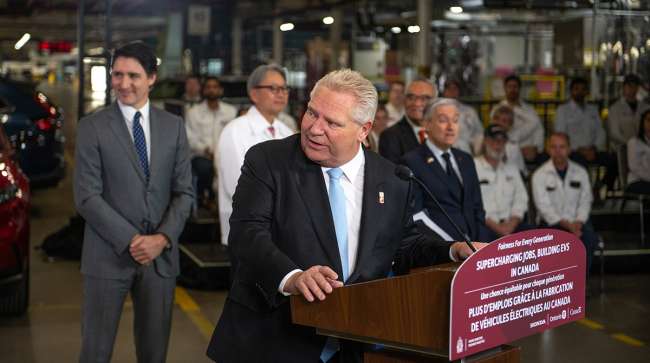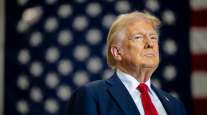Associated Press
Ontario Premier Issues Energy Warning Over Trump Tariffs

[Stay on top of transportation news: Get TTNews in your inbox.]
TORONTO — The premier of Canada’s most populous province said Dec. 11 he will cut off energy to the United States if President-elect Donald Trump imposes sweeping tariffs on all Canadian products.
Trump has threatened to impose a 25% tax on all products entering the U.S. from Canada and Mexico unless they stem the flow of migrants and drugs.
“We’re going to put our list together, and I’m sure the other provinces will as well. But we will go to the full extent, depending on how far this goes. We will go to the extent of cutting off their energy,” Ontario Premier Doug Ford said after meeting with Canadian Prime Minister Justin Trudeau and other provincial premiers.
Ford said he didn’t want this to happen but wasn’t optimistic Canada could avoid tariffs.
It’s been a busy day getting it done here in Ontario. Check out what we did today, Wednesday, December 11:
✅ I joined the prime minster and premiers from across the country to discuss a Team Canada approach to border security and how we need to be ready on day one of the… — Doug Ford (@fordnation) December 12, 2024
“This fight is 100% coming on Jan. 20 or Jan. 21,” he said, referencing to the date of Trump’s inauguration.
“We will use every tool in our tool box to fight back. We can’t sit back and roll over. We just won’t as a country. And isn’t this a shame, our closest friends and allies.”
About 60% of U.S. crude oil imports are from Canada, and 85% of U.S. electricity imports as well.
It wasn’t immediately clear if Ford was talking about all Canadian provinces cutting off energy exports to the U.S. or just his province. But a spokeswoman for Ford, Grace Lee, said it was raised in the call between Trudeau and the provincial premiers.
“Premier Ford can only speak on behalf of Ontario, but its an area of provincial jurisdiction that we would certainly look at,” Lee said in an email.
Lee noted Ontario powered 1.5 million homes in the U.S. in 2023 and is a major exporter of electricity to Michigan, Minnesota and New York.
Trump’s transition team did not immediately respond to a request for comment on the threat.
Canada is also the largest foreign supplier of steel, aluminum and uranium to the U.S. and has 34 critical minerals and metals that the Pentagon is eager for and investing for national security.

Freeland
“Canada, of course, will respond to unjustified tariffs,” Deputy Prime Minister Chrystia Freeland said after the meeting.
Freeland said a number of provincial premiers voiced support for a robust response to the tariffs and said that included critical minerals that are exported to the U.S.
She didn’t specifically mention oil but said “obviously other ideas were discussed as well” when asked if Canada is considering cutting off oil exports to America.
About a third of Canada’s trade to the U.S. is energy.
Nearly $3.6 billion Canadian (U.S. $2.7 billion) worth of goods and services cross the border each day. Canada is the top export destination for 36 U.S. states.
Canada has promised more border security spending to address Trump’s concerns. Ford said that will include more border and police officers as well as drones and sniffer dogs.
“A priority will be to share details of this plan with the incoming Trump administration and with Canadians in the coming days,” Public Safety Minister Dominic LeBlanc said.
Trudeau said this week tariffs would be “absolutely devastating” for the Canadian economy, but it would also mean real hardship for Americans.
Economists say companies would have little choice but to pass along the added costs, dramatically raising prices for food, clothing, automobiles, alcohol and other goods.
The Produce Distributors Association, a Washington-based trade group, has said tariffs will raise prices for fresh fruit and vegetables and hurt U.S. farmers when the countries retaliate.
Lori Heino-Royer of Waabi discusses the latest developments, breakthroughs and key industry partnerships in autonomous trucking. Tune in above or by going to RoadSigns.ttnews.com.
Canada imposed duties in 2018 against the U.S. in a tit-for-tat response to new taxes on Canadian steel and aluminum.
Canada’s central bank, meanwhile, lowered its key interest rate by half a percentage point on Dec. 11 and called Trump’s threat to impose sweeping new tariffs on Canada “a major source of new uncertainty.”
“We did underline that the threat of new tariffs on Canadian exports, particularly at the level suggested, that is a major source of new uncertainty,” Bank of Canada Tiff Macklem said at a press conference. “But the reality is we don’t know if those tariffs are going to be implemented.
“We don’t know if exemptions are going to be agreed on some parts, we don’t know at what level, we don’t know if Canada will take retaliatory measures.”
Trudeau, meanwhile, got the attention of billionaire Elon Musk, a big supporter of Trump, with comments he made Dec. 10 lamenting that U.S. voters selected Trump over Kamala Harris as president.
Want more news? Listen to today's daily briefing above or go here for more info
“We were supposed to be on a steady if difficult sometimes march toward progress. And yet, just a few weeks ago, the United States voted for a second time to not elect its first woman president,” Trudeau said at a event sponsored by Equal Voice, an organization dedicated to improving gender representation in Canadian politics. “Everywhere, women’s rights and women’s progress is under attack — overtly and subtly.”
Musk called Trudeau “insufferable” in a post on X. “Won’t be in power for much longer,” he wrote.
Ford also criticized Trudeau for the remarks.
“They are not helpful at all. It was brought up a couple of times in our meeting,” Ford said. “Donald Trump was elected democratically. If you like him or you don’t like him that’s not our issue. We elect Canadians and it was not helpful whatsoever. I’m sure the prime minister got the message loud and clear.”





